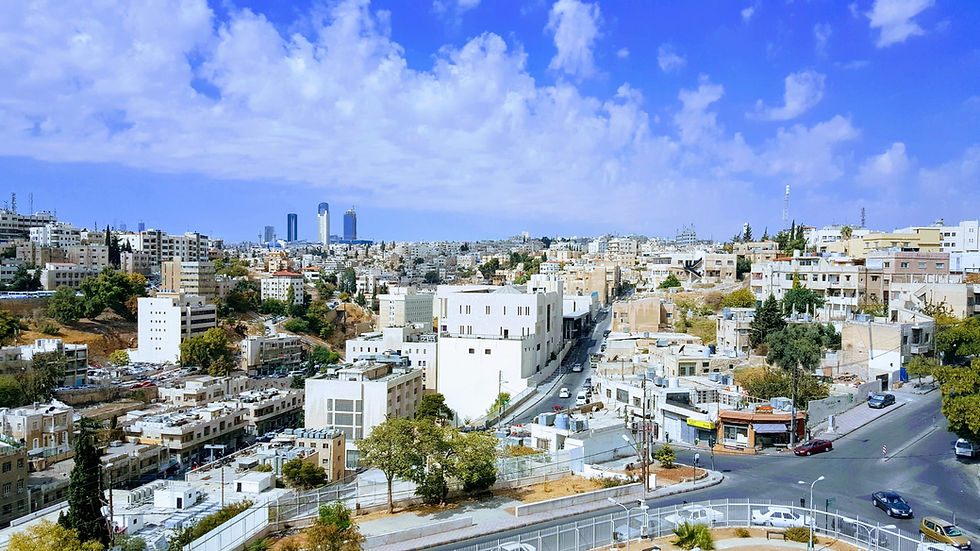Arab Spring - Ten years on, it is yet to take effect in Jordan
- Mitchell Thomas
- May 2, 2021
- 4 min read
Updated: Dec 17, 2021

Mitchell Thomas
In early April 2021, Jordanian authorities arrested several former politicians, political advisors and some members of the Hashemite royal family associated with an alleged coup to destabilise the Jordanian throne.
Former Crown Prince Hamzah bin Hussein – the former heir to the Jordanian throne – was among them. The former Heir indicated in a video sent to the BBC, that he had “a visit from the chief of the general staff [sic] of the Jordanian Armed Forces” and that he was not “allowed to go out to communicate with people or to meet with them”. Some media outlets reported that the military denied his house arrest, indicating instead that Hamzah was asked not to associate with “movements and activities” targeting the “Kingdom’s security”.
After the string of arrests were made, the country’s Deputy Prime Minister Ayman Safadi held a news conference. In it, he said that the former Crown Prince had some involvement in attempts to destabilise the kingdom through his loose association with critics of the royal family.
Whether these meetings posed a credible threat to the overall stability of the Hashemite Kingdom is questionable. However, what is unquestionable is Hamzah’s outsider status within his own family as a critic and advocate for progress within Jordan. While Hamzah may be the only critic within the Hashemite dynasty, he is not the only critic in Jordan.
The growing public discontent with the governing Jordanian royal family has been brewing for some time. Indeed, protests as far back as 2011, at the height of the Arab Spring, which called for regime reform and better economic management indicate the seeds of discontent were planted some time ago. While the Arab Spring led to the ousting of Tunisian, Egyptian, Yemeni and Libyan rulers, Jordan’s monarchy was let off lightly with only some electoral and political reforms.
With the outbreak of the Syrian Civil War and the rise of the Islamic State in Iraq and the Levant (ISIL) from 2014, Jordanian responses were confined to a small series of airstrikes. This was until the barbaric murder of a Jordanian pilot, Muath al-Kasabeth. The atrocious live burning of al-Kasabeth, who was shot down over ISIL territory in 2014, triggered a wave of outrage in Jordan along with an increase in airstrikes on the caliphate organisation by order of the King.
The public's appetite for action was palpable, but despite the response by the King, his direct reaction to the murder of al-Kasabeth did not dispel protestors disgruntled with their conditions and protests eventually resumed. Various protests over an Israeli gas deal, labour protests in 2016 and protests over new tax laws in 2017 and 2018 indicated a growing tide of discontent with Jordan’s socioeconomic situation. This has continued up to the present day with protests erupting over COVID-19 mismanagement. Despite Jordan being one of the first countries to institute a complete COVID-19 lockdown, case numbers have still increased considerably.
With the decade-long growth of discontent with Jordan’s government, the line of succession in the Jordanian royal family has been the subject of controversy as well. It could also go some way in explaining the recent tumult in the kingdom.
When King Hussein died in 1999, his eldest son Abdullah inherited the throne, however, this included a provision for Hamzah bin Hussein to become Crown Prince. But in 2004, King Abdullah II dismissed Hamzah claiming that Hamzah was “too restricted” by the symbolic title and Hamzah lost his place in the line of succession. If Hamzah still holds powerful ambitions for the throne, it is unlikely he will succeed. The only way for this to change is if King Abdullah II makes the necessary changes to the line of succession.
The growth in discontent in Jordan is also concerning for both Israel and the United States given Jordan’s position as a buffer state between Israel and the majority of the Middle East. Being one of the few countries that maintain cordial relations with Israel, an unstable Jordan would pose a range of strategic risks for the US and Israel. Given the US’ adverse stance to further encroachment in the Middle East – even backtracking on involvement in Syria during Assad’s reign – it is highly unlikely the US would intervene even if the situation demanded it.
Jordan’s low levels of political and media freedom and the country’s increasing debt and spiking unemployment will likely trigger more protests in the coming years. This, coupled with a regime that survived the Arab Spring and has supreme command of all the armed forces, means the struggles of the Jordanian people will continue.
The Hashemite dynasty and its monarch are one of the most powerful royal families in the world. While growing discontent within Jordan is unlikely to topple it at this stage, the same was said of many regimes during the Arab Spring. Ten years on, Jordan is only starting to feel the effects of the movement that swept across the Middle East and North Africa.
Mitchell Thomas holds a Bachelor of Arts (Government and International Relations) from Sydney University. He writes with a number of outlets and is interested in globalisation, defence policy, cybersecurity and human rights. He is currently undertaking post graduate studies in Cybersecurity and Information Technology.

















Comments